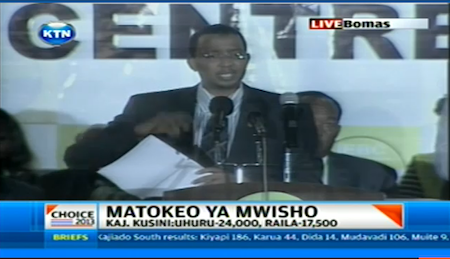Issack Hassan, the chairman of Kenya’s Independent Boundaries and Elections Commission (pictured above) has now given a briefing on the state of Kenya’s less-than-optimal vote-counting process.![]()
The IEBC’s automatic electronic updates had slowed to a crawl on the second full day after Monday’s election, and Hassan admitted that the results have not been announced as rapidly as Kenyans have expected amid multiple technical glitches.
Hassan stated that the IEBC would abandon the electronic process in favor of manual counting, and rather defensively called on all of the parties and candidates to be patient, to allow the IEBC to do its work and not to escalate tensions.
“We want to plead with the political parties… and the presidential candidates and their agents to remember the code of conduct and allow the Commission to do its work.”
Earlier in the day, the IEBC announced final results from Kenyans abroad — Raila Odinga won 1224 votes to 951 for Uhuru Kenyatta.
By law, the IEBC must announce results within seven days, so a Friday announcement is not necessarily a failure under Kenya’s election law.
But given that the 2007 elections were followed by delays — especially, like this time, by an initial partial release of results from Mount Kenya and Kikuyu strongholds, to the exclusion of the coastal and western provinces where Odinga ran strongest in 2007 — and is expected to run in 2013 — have only made the past 48 hours even more tense.
In addition, the presence of a high amount of spoiled votes (up to 7% of the total previously announced in the electronic tally), and the IEBC’s decision that such votes will ‘count’ toward whether a candidate has won a 50% ‘absolute majority’ has been met with jeers from Kenyatta’s Jubilee alliance.
